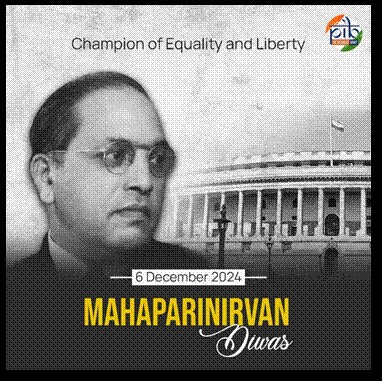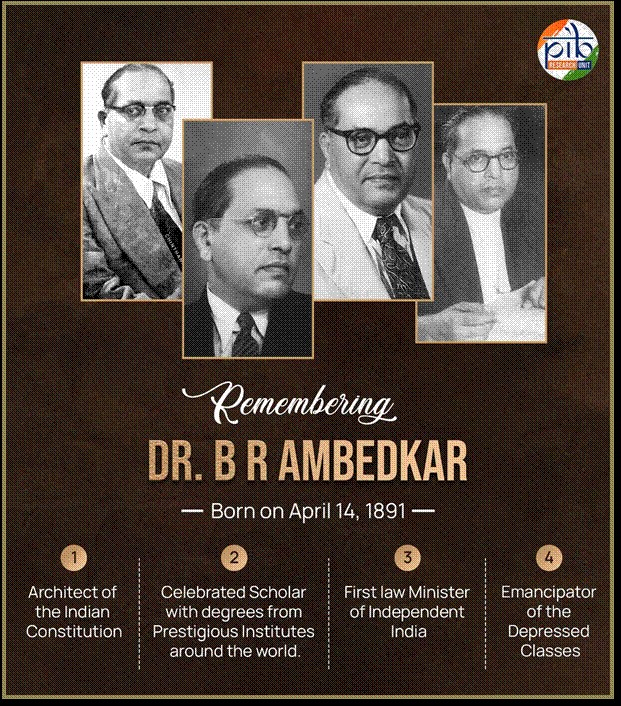Ministry of Social Justice & Empowerment
Mahaparinirvan Diwas
The Life and Legacy of Dr. B.R. Ambedkar
Posted On:
05 DEC 2024 3:06PM by PIB Delhi
Cultivation of mind should be the ultimate aim of human existence.
—Dr. B. R. Ambedkar
Mahaparinirvan Diwas is observed annually on December 6 to commemorate the death anniversary of Bharat Ratna Dr. Bhimrao Ramji Ambedkar, fondly known as Babasaheb Ambedkar, the chief architect of the Indian Constitution. Dr. Ambedkar, a revered leader, thinker, and reformer, dedicated his life to championing equality and eradicating caste-based discrimination. Millions across India pay homage to his legacy on this solemn day by reflecting on his teachings and commitment to building a just and inclusive society.

The Mahaparinirvan Diwas 2024, which marks the 69th death anniversary of Babasaheb Dr. B.R. Ambedkar, will be observed by the Dr. Ambedkar Foundation (DAF) on behalf of the Union Ministry of Social Justice and Empowerment at Prerna Sthal, Parliament House Complex, on December 6, 2024. The day’s observance will commence with floral tributes from prominent leaders, including Vice President Shri Jagdeep Dhankar, Prime Minister Shri Narendra Modi, and other members of Parliament. The event invites everyone to pay respect to Dr Ambedkar’s life and legacy!
Significance of Mahaparinirvan Diwas
Mahaparinirvan Diwas holds profound significance as a tribute to Dr. B.R. Ambedkar’s transformative legacy. According to Buddhist texts, Lord Buddha's death is considered to be Mahaparinirvan, the Sanskrit term for 'nirvana after death'. Parinirvan is considered liberation from Samara, karma, and the cycle of death and birth. It is the most sacrosanct day in the Buddhist calendar.
To Babasaheb Ambedkar, the social reformer, Buddha lay very close in terms of his ideology and thoughts. Babasaheb was regarded as a Buddhist guru because of his great influence in India to eradicate the social scourge of untouchability. Ambedkar's admirers and followers believe he was as influential as Lord Buddha, which is why his death anniversary is celebrated as Mahaparinirvan Divas. This day transcends mourning, serving as a day of reflection and inspiration, urging us to carry forward his vision of a just and inclusive world.
Dr. B.R. Ambedkar’s Advocacy for Social Justice
Dr. B.R. Ambedkar, born on April 14, 1891, in Mhow, Madhya Pradesh, dedicated his life to uplifting marginalized communities, especially Dalits, women, and labourers, who faced systemic social discrimination. A visionary reformer and tireless advocate of equality, Ambedkar recognized that caste oppression was fracturing the nation and sought transformative measures to address these deep-rooted injustices.
He proposed revolutionary steps to empower the oppressed, including reservations in education, employment, and politics. As a social reformer, he launched the newspaper Mooknayaka (Leader of the Silent) to amplify the voices of the downtrodden. He established the Bahishkrit Hitkarini Sabha (Outcastes Welfare Association) in 1923 to spread education, improve economic conditions, and address societal inequalities. His leadership in historic movements such as the Mahad March (1927) for access to public water and the temple entry movement at Kalaram Temple (1930) challenged caste hierarchies and priestly dominance.
Dr. B R Ambedkar’s pivotal role in the Poona Pact of 1932, which replaced separate electorates with reserved seats for Dalits, marked a turning point in India’s fight for social justice. Deeply inspired by Buddha’s teachings, Dr. Ambedkar embraced Buddhism as a path to liberation and an antidote to caste-based oppression.

Building a Nation!
Dr. B.R. Ambedkar’s contributions to the making of modern India go far beyond his role as the principal architect of the Indian Constitution. He envisioned a nation that not only upheld political democracy but also achieved social and economic justice. His profound intellect and vision influenced key economic and social frameworks, making him an essential force in shaping independent India’s governance and development.
Ambedkar’s doctoral thesis inspired the establishment of the Finance Commission of India. At the same time, his ideas were instrumental in framing the guidelines for the Reserve Bank of India (RBI) Act, 1934, and influencing the creation of the RBI itself. He was one of the founders of Employment Exchanges in our country. He championed systemic advancements such as the foundation of Employment Exchanges, the establishment of the National Power Grid System, and pivotal projects like the Damodar Valley Project, Hirakud Dam Project, and Sone River Project, showcasing his foresight in infrastructure and resource management.
As Chairman of the Constitution Drafting Committee, Ambedkar played a pivotal role in crafting the Indian Constitution, presenting a draft in 1948 that was adopted in 1949 with minimal changes. His emphasis on equality and justice ensured provisions that protected the rights of Scheduled Castes, Scheduled Tribes, and Other Backward Classes, laying the groundwork for an inclusive democracy. Dr. B R Ambedkar was posthumously awarded the Bharat Ratna by the Government of India in the year 1990.
Dr. BR Ambedkar’s multifaceted contributions from economic policy and infrastructure to constitutional law cemented his legacy as a nation-builder, committed to fostering a just and equitable India. This Mahaparinirvan Diwas, we are reminded to uphold his ideals of justice, equality, and liberty, drawing inspiration from his life to continue the journey toward a more just and harmonious world.
References
https://amritmahotsav.nic.in/blogdetail.htm?49
https://static.pib.gov.in/WriteReadData/specificdocs/documents/2023/apr/doc2023413180601.pdf
https://pib.gov.in/PressReleseDetailm.aspx?PRID=1916229®=3&lang=1
https://www.mea.gov.in/books-by-ambedkar.htm
Mahaparinirvan Diwas
*****
Santosh Kumar/ Ritu Kataria/ Madiha Iqbal
(Release ID: 2081050)
Visitor Counter : 21598